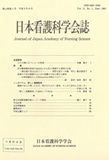Japanese
English
- 販売していません
- Abstract 文献概要
- 参考文献 Reference
- サイト内被引用 Cited by
要旨
本研究の目的は,在宅酸素療法(Home Oxygen Therapy:HOT)患者のQuality of Life(QOL)の構造を明確にし,効果的な看護介入のあり方を検討することである.Maslow A.H. のニード論を概念枠組とし,QOLを,患者の「療養への満足度」と定義し,指標にはPGCモラールスケールを用いた.対象は,関東地区の1区役所と2病院で管理している慢性呼吸不全患者の内,成人HOT患者32名(内,女性14名,平均年齢67.4歳,平均HOT期間2年4ヶ月)と,その家族である.資料の収集は,患者及び家族に対する質問紙調査,面接調査,観察法を家庭訪問によって行った.分析は,量的,質的方法で行った.その結果,以下の知見を得た.
(1) 対象の疾患やHOTの状況に,施設差はなかった.(2) 質問紙調査の結果,PGCモラール得点の平均は10.6点で,健康老人と同じ位満足感が高かった.その他の指標には施設差がみられなかったにも拘らず,区役所の対象に比べ,2病院の対象では満足感が有意に高かった.これら2病院では,保健婦が,患者の退院前から移行期,安定期へと継続的かつタイムリーに援助しており,この援助は効果のある事が示された.(3) パス解析の結果,HOT患者の満足感には,患者の身体的要因(自覚症状が少ない・日常生活動作の自立)が,心理的要因(自尊心が高い・不安が少ない)や,社会的要因(家庭内役割の有無・仕事の継続の有無)を介して影響する事,その際,患者支援ネットワーク(情緒的支援・専門職からの支援)も関与していることが示された.(4) 事例による質的分析においても上記の関係が検証された.(5) 今後,患者の活動範囲拡大のための支援・情報ネットワーク作りが必要であることが示唆された.
Abstract
The purposes of this study were to clarify the structure of HOT patients' Quality of Life (QOL) and to examine an affective system of nursing care for them. We used Maslow A.H.'s theory of human needs as the conceptual framework. HOT patients' QOL was defined as their own “subjective life satisfaction,” and The Philadelphia Geriatric Center (PGC) Morale Scale was used as its indicator. The subjects were thirty-two adult patients suffering from chronic respiratory failure with HOT, including fourteen females, who were registered at one city office and two hospitals in the Kanto area, and their families. Their average age was 67.4, and the average HOT period was two years and four months. The data was collected by questionnaire, interview and observation methods at their homes. The data analyses were conducted in two steps-quantitative and qualitative methods. The results were as follows:
(1) Among the three institutions, no difference was detected in the subjects' disease nor HOT conditions. (2) The average score on the PGC Scale was 10.6, which was as high as some healthy elderly persons. The average PGC scores of the subjects at the two hospitals were significantly higher than those of the city office though there was no difference among the three institutions in the other items. In these two hospitals, public health nurses cared for the patients as soon as the physician decided on the therapy in the hospital, then while they are being transferred to their homes, and after their conditions have stabilized continuously in a timely manner. Such support by the hospital public health nurses was very effective and recommended. (3) By path analyses, it was pointed out that the HOT patients' QOL was positively affected by their physical factors-less subjective symptoms of respiratory failure and independent ADL- through their psychological factors-positive self-esteem and less anxiety-and sociological factors-patients' roles at home and continuation of their jobs. The existence of a support network-emotional support and care provided by specialists-contributed indirectly to a higher QOL. (4) The above relationships among QOL and the other four factors were verified concretely in each case by qualitative analyses. (5) In order to expand the HOT patients' activity in various fields, it is necessary to make networks to provide support and information to them.
Copyright © 1991, Japan Academy of Nursing Science. All rights reserved.


